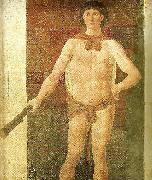Wholesale Oil Painting No Minimum |
|||||||||||
|
|
|||||||||||

|
|||||||||||
|
|
|
||||||||
Piero della FrancescaItalian Early Renaissance Painter, ca.1422-1492 Italian painter and theorist. His work is the embodiment of rational, calm, monumental painting in the Italian Early Renaissance, an age in which art and science were indissolubly linked through the writings of Leon Battista Alberti. Born two generations before Leonardo da Vinci, Piero was similarly interested in the scientific application of the recently discovered rules of perspective to narrative or devotional painting, especially in fresco, of which he was an imaginative master; and although he was less universally creative than Leonardo and worked in an earlier idiom, he was equally keen to experiment with painting technique. Piero was as adept at resolving problems in Euclid, whose modern rediscovery is largely due to him, as he was at creating serene, memorable figures, whose gestures are as telling and spare as those in the frescoes of Giotto or Masaccio. His tactile, gravely convincing figures are also indebted to the sculpture of Donatello, an equally attentive observer of Classical antiquity. In his best works, such as the frescoes in the Bacci Chapel in S Francesco, Arezzo, there is an ideal balance between his serene, classical compositions and the figures that inhabit them, the whole depicted in a distinctive and economical language. In his autograph works Piero was a perfectionist, creating precise, logical and light-filled images (although analysis of their perspective schemes shows that these were always subordinated to narrative effect). However, he often delegated important passages of works (e.g. the Arezzo frescoes) to an ordinary, even incompetent, assistant. |
||||||||
|
|
||||||||
hercules
hercules Painting ID:: 64950 |
boston, isabella stewart gardner museum detached fresco
151 by 126cm
se boston, isabella stewart gardner museum detached fresco 151 by 126cm se |
|||||||
|
|
||||||||
|
Charles le Brun French Baroque Era Painter, 1619-1690 French painter and designer. He dominated 17th-century French painting as no other artist; it was not until over a century later, during the predominance of Jacques-Louis David, that artistic authority was again so concentrated in one man. Under the protection of a succession of important political figures, including Chancellor Pierre S?guier, Cardinal Richelieu and Nicolas Fouquet, Le Brun created a series of masterpieces of history and religious painting. For Louis XIV and his chief minister Jean-Baptiste Colbert he executed his greatest work, the royal palace of Versailles: an almost perfect ensemble of architecture, decoration and landscape. After Colbert's death in 1683, he was no longer able to count on prestigious commissions Hercules between 1658(1658) and 1661(1661) Medium oil on canvas cyf |
||||||||
|
|
||||||||
|
Prev Next
|
||||||||
|
|
||||||||
|
Related Paintings to Charles le Brun :. |
||||||||
|
|
||||||||
|
CONTACT US |

